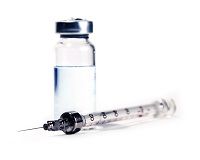IL-17A Inhibitor Significantly Improved Signs and Symptoms of Psoriatic Arthritis in Year-Long Study
Researchers announced a phase 3 trial assessing secukinumab for the treatment of psoriatic arthritis met its primary endpoint (ACR 20 at week 24), possibly putting the drug on the fast track to approval.

A phase 3 trial of a new drug for psoriatic arthritis has met its primary endpoint and, quite possibly, qualified for fast track approval.
Researchers compared placebo with an interleukin-17A inhibitor called secukinumab (Cosentyx) for a year; 100 patients received 300 mg injections, 100 received 150 mg injections, 99 received 75 mg injections, and 98 received placebo injections.
Fully 54% of the patients who received the 300 mg dose (p<.0001) and 51% who received the 150 mg dose (p<.0001) achieved the primary endpoint of the trial, which was meeting American College of Rheumatology 20 (ACR20) response criteria after the 24th week of treatment. Only 15% of patients in the placebo group met ACR 20 criteria at week 24.
But the results, which were just published in The Lancet, got better with time. By the 1-year point, 64% of the patients who received either the 300 mg dose or the 150 mg dose met ACR 20 response criteria. What’s more, 44% of the 300 mg patients and 39% of the 150 mg patients met the more criteria of ACR 50.
ACR 20 is designed to determine whether patients have experienced a 20% improvement in symptoms since baseline, while ACR 50 is designed to determine whether patients have seen a 50% improvement. The numbers achieved by secukinumab on both measures were very strong, the study team wrote.
"Secukinumab is the first IL-17A inhibitor to show consistent efficacy through one year in psoriatic arthritis, psoriasis, and ankylosing spondylitis” said Vasant Narasimhan, the Global Head of Development, for Novartis Pharmaceuticals in a statement from the company.
“Novartis has recently filed global regulatory submissions for secukinumab in both psoriatic arthritis and ankylosing spondylitis and will continue to work to bring this important advance to patients with these debilitating diseases.”
Secukinumab, in both the 300 mg and 150 mg doses, also met a secondary trial endpoint, which was achieving 90% improvements in the Psoriasis Area and Severity Index (PASI) for a majority of patients. Patients who achieve PASI 90 have virtually none of itchy, scaly and painful skin lesions that are typical of psoriasis, which, in turn, is a comorbidity for the majority of patients with psoriatic arthritis. (This success was to be expected. Secukinumab is already approved in the US for moderate to severe plaque psoriasis.)
The secukinumab trial results indicate that the compound works better in patients who have never been exposed to the current standard of care, drugs that inhibit the tumor necrosis factor (TNF) that plays a role in inflammatory response. That said, Novartis believes the trial results indicate that secukinumab works well enough in patients who have already received anti-TNF therapy to be a viable option for patients who do not tolerate such medications well and for those who are not satisfied with their performance.
As for tolerance of secukinumab itself, the results of the new trial were consistent with those from the very large trials (with nearly 5,000 patients in all) that led to the drug’s psoriasis approval. The most common adverse events were upper respiratory tract infections and common colds.